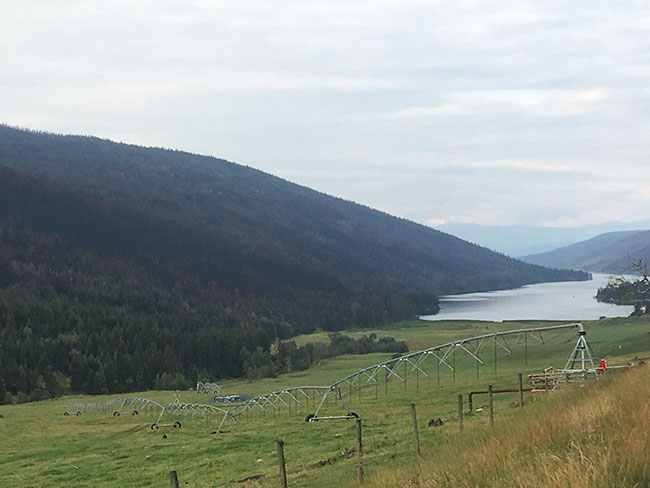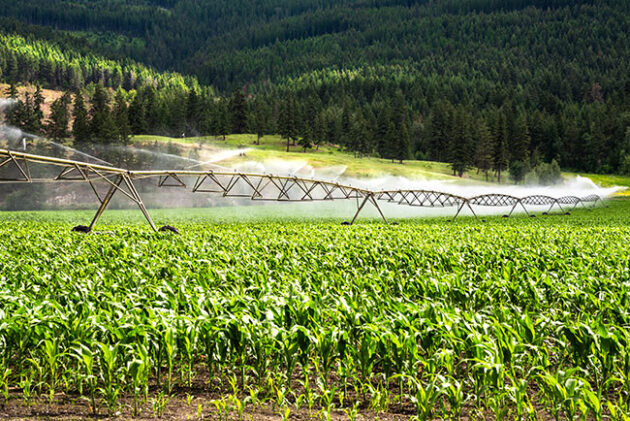
Features
Environment
Water Issues
Is B.C.’s drought a warning sign? Call for province to improve its communications
Province seeing drought conditions not seen before
April 15, 2024 By James Careless
 The B.C. government is offering to compensate farmers for their losses due to irrigation stoppages.
Photo credit: Courtesy of James Careless
The B.C. government is offering to compensate farmers for their losses due to irrigation stoppages.
Photo credit: Courtesy of James Careless The year 2023 was terrible for groundwater in British Columbia. “The B.C. government has a Drought Information Portal where they rank drought conditions in the province from one to five, five being the worst,” Dave Mercer, hydrogeologist and general manager of the B.C.
Ground Water Association, said. “About 80 per cent of the watersheds in the province were at level four or five at some point during 2023. So, it’s unprecedented. I don’t think we’ve ever seen province-wide drought conditions like that before.”
The reason B.C. had such a dry 2023 was due to several factors.
“It was actually a bit of a perfect storm,” Mercer said. “(The year) 2023 started with a decent snowpack. But in most parts of the province, warm weather came on so fast that the snowpack was gone in a matter of weeks. So instead of having time for that to trickle down into the ground and help replenish aquifers, it washed away very quickly. As a result, we lost that replenishment from the melting of the snowpack. And then it was simply the conditions that lead to drought, namely a lack of rain. Vancouver, where I live, had an absolutely gorgeous spring and summer, unlike anyone can recall. And that was great for the beach, but it’s not great for…again…topping up our water levels.”
To cope with the drought, B.C.’s Ministry of Water, Land and Resource Stewardship made some decisions that seriously upset farmers in the province’s Okanagan region. The government’s management of the 2023 drought crisis – and some would say mishandling – is worth studying at a time when climate change may well reduce people’s access to sufficient water resources.
What happened
Drought-induced water shortages are nothing new to British Columbia. In fact, the province “is prone to experiencing drought,” said the B.C.’s Ministry of Water, Land and Resource (the ministry) in written answers provided to Ground Water Canada magazine. But “2023 brought extreme drought conditions for many basins in the province.”
Things got so bad, that the ministry feared that the province’s 2023 salmon spawning run would be seriously affected if water levels got too low. And that’s not the only impact: B.C. Hydro’s ability to generate power is being hampered, because “there’s just not enough water in the rivers to run the turbines in their hydroelectric dams,” Mercer said.
This is why the ministry first called for farmers in certain areas to cut back on their use of water in 2023, and then ordered some farmers in the Okanagan to stop irrigating entirely. Because water rights in Canada belong to the Crown (the government), the ministry had the power to do this. (According to Mercer, “Under the Constitution Act [1867], the provinces are ‘owners’ of the water resources and have wide responsibilities in their day-to-day management.”)
“In four areas, drought conditions were so severe we initiated targeted temporary protection orders (TPOs) restricting specific water uses, including the irrigation of forage crops, to help restore water flow levels and protect sensitive fish species,” the ministry explained. “As low waterflows increase water temperature and other risks for fish populations, restrictions were necessary to support sensitive fish species to survive drought conditions. TPOs are revoked if water flows recover. TPOs do not apply to water use that does not require a licence, such as small garden irrigation (area under 1,000 square metres) or domestic purposes. It also does not apply to water users that are supported by off-stream water storage. Irrigation of forage crops is one of the most water-intensive agricultural water uses.
“Decisions to restrict water usage are always made as a last resort – recognizing the impact on people and businesses,” the ministry added. “The collective efforts of water licensees to conserve water, were effective in delaying the need to implement orders to curtail water use. Orders to curtail water use are a balance between water use and environmental flow needs.”
Not a happy reaction
Mercer described what happened in much plainer language. “In the interior of British Columbia, the government asked farmers to stop irrigating,” he said. “Inevitably, if you’re going to ask someone to stop pumping and potentially lose a crop, it’s not a good thing.”
Not good, indeed. “Farmers and ranchers in Westwold are incensed over a fish protection order that has cut off water needed to irrigate crops that will see them through winter, and voiced their frustrations at a community meeting Saturday morning,” said a Sept. 3, 2023 report in the Vernon Morning Star. Reporting on a town hall meeting the day before, where more than 200 people gathered to discuss the restrictions, journalist Brendan Shykora wrote, “One farmer said she was forced to sell some of her cows because she didn’t have feed for them. Another resident said it was ‘disrespectful’ of the government not to have a representative present at the community meeting to explain the now two-week-old decision. Some residents have reported receiving fines of $500 or more for watering against the order.”
The restrictions have spurred reactions such as the YouTube protest video series Stolen Water. The first video garnered 117,000 views in its own right.
Paul Pryce is director of policy with the B.C. Agriculture Council (BCAC), the industry association “comprising about 28 unique commodity groups growing anything from apples to turkeys,” he said. “Our membership accounts for about 96 per cent of the farm gate sales in the province, or about 20,000 farm families through British Columbia.”
Pryce places the blame for the B.C. farming industry’s unhappy reaction to the “stop irrigating” orders squarely on the ministry.
“I think everyone agrees, including the government, that the drought communication wasn’t really handled as well as it could have been last year,” he said. “And, so, we’re working with them to ensure that this communication is handled a lot better this year, and that the focus is on education and awareness – including hard data to show why these measures are needed and what results they will deliver. We want to arm farmers with the tools they need so that they’re able to produce a good crop and that there’s no undue stress being placed on watersheds rather than what we had last year, which was compliance and enforcement being the first resort rather than education and awareness building.
“I’d also say that farmers want to be active players in ensuring good watershed health, and no one wants to see depleted aquifers,” Pryce added. “There can’t be that situation where, when all you have is a regulatory hammer, everything that seems to defy that regulation looks like a nail.”

Farmers in some parts of British Columbia were told to cut back on their irrigation in 2023.
Photo credit: Alpegor/Adobe Stock
A need for better communication
Mercer agreed with Pryce that the B.C. government needs to do a better job of communicating their water conservation policies to farmers and the general public. “They put a lot of information on their drought website, but people don’t necessarily go to their website for information,” he said. “So, they really need to figure out how they’re going to communicate what they’re doing to the public better. That’s where the BCGWA, the BCAC, and magazines like Ground Water Canada can help.”
The ministry seems open to outside input. “We have been listening to and working with farmers and ranchers so we can provide the programs and support that meet their unique needs,” they said in their answers to GWC. “Ministry staff have been holding regional workshops throughout the fall and more are planned in the spring to ensure producers have the best information possible, understand the process around how water use decisions are made and are aware of government programs and support.”
The B.C. government is also willing to compensate farmers for losses caused by its “stop irrigation” orders.
“In summer 2023, our government partnered with the B.C. Cattlemen’s Association on a new Access to Feed program to help farmers with the shortage of feed and hay,” the ministry said. “The AgriRecovery program is providing up to $71 million to help B.C.’s farmers and ranchers who experienced losses due to this year’s wildfire and drought. AgriRecovery helps replace or repair damaged, uninsurable, infrastructure and expenses incurred to keep animals fed, sheltered and safe.”
The outlook for 2024
In a perfect world, the drought that is at the root of these issues would magically disappear in 2024. But this isn’t a perfect world. Instead, based on groundwater levels as of January 2024 and information from the B.C. Drought Portal, groundwater levels in a high proportion of B.C. wells are still below normal levels.
To be precise, “the total number of wells below normal levels is roughly the same as this time last year,” said the ministry. “This suggests that groundwater levels in many aquifers have not substantially increased from levels observed last year. Drought-related impacts on groundwater supply and groundwater-dependent aquatic ecosystems are of concern for these aquifers, particularly in the South Coast (Lower Mainland) and West Coast (Vancouver Island) regions of the province.”
On the good news side of this story, “The Watershed Security Strategy, to be released in 2024, is considering how new approaches to policy and legislation can introduce greater flexibility in how water is managed and to better prepare for times of water scarcity,” the ministry said. As well, the BCAC’s Pryce is “optimistic that we can work with this government to address these issues. Absolutely, we have to protect fish populations, but we also have to ensure the food security of communities, which depends on reliable access for farmers to water.”
One possible way to balance both sides is through the government implementing the BCAC’s concept of “agricultural water reserves,” where farmers would be guaranteed an annual allocation from their local watersheds. “Knowing that I’m going to have this amount of water, so that I can proceed with this amount of crops would be a great improvement,” Pryce said. “Right now, it’s a case of just taking a risk and hoping that in three months’ time someone doesn’t say, ‘sorry, you can’t water your forage anymore.’”
Whatever does happen, the struggles and solutions associated with the B.C. drought may well repeat themselves in other jurisdictions. In fact, a CBC News headline dated Jan. 31, 2024 that reads, “Alberta to launch ‘unprecedented’ water-sharing negotiations Thursday amid drought fears,” signals that this may already be the case.
Print this page